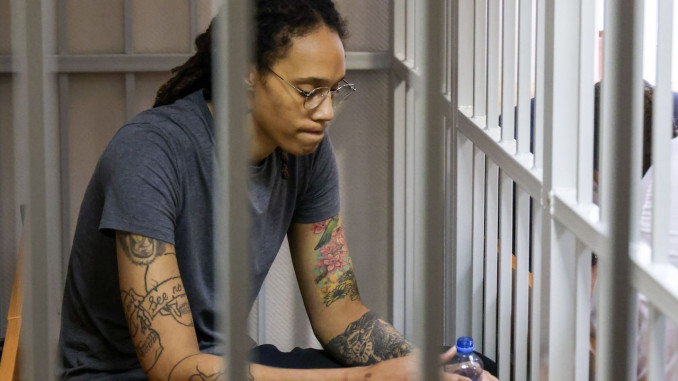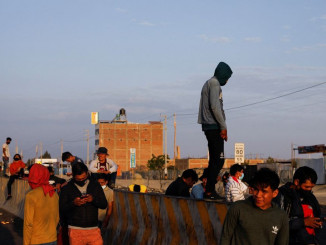
Last week, a Russian court rejected U.S. basketball superstar Brittney Griner’s appeal of her nine-year prison sentence for the so-called crime of possessing two vape cartridges of marijuana in her luggage.
At her trial, Griner admitted to having the canisters — a very small amount of marijuana — in her luggage, but testified that she packed them unintentionally as she hurried to make her flight. Her defense team also presented evidence that she had been prescribed cannabis to treat her chronic pain.
She is now set to serve out the rest of her sentence in a penal colony in Russia — she could be there for eight years. According to the New York Times, she spends her days in a small cell with two other prisoners, allowed outside once a day for an hour, and granted only two showers per week. Now that her appeal has been denied, she could be transferred to an even worse penal colony, or a prison labor camp for women where she could spend hours a day sewing or doing other work.
Griner has only been able to speak with her family twice since February. After the last call, her wife, Cherelle Griner, said that she heard exhaustion and fatigue in her wife’s voice. She said it was “the most disturbing phone call [she’d] ever experienced” and afterwards she “cried for about two, three days straight.”
Griner is an eight-time all-star center with the WNBA’s Phoenix Mercury and a two-time Olympic gold medalist. She was arrested in February, upon returning to Russia to play for a Russian team during the WNBA’s offseason. If she is forced to serve out her sentence, her basketball career will be over, and her health, and even her life, will be severely at risk.
The Biden administration claims it is doing everything it can to negotiate a prisoner swap with Russia in order to get Griner released. But none of these efforts are spoken about publicly with any detail, so it is difficult to evaluate how seriously they consider the matter. Griner’s arrest came just days before Russia sent troops to invade Ukraine. And given the escalating tensions between Russia and the U.S., it seems clear that Russia intends to keep Griner hostage as a bargaining chip. It seems doubtful that Griner, a Black female athlete, is really a top priority of the Biden administration.
Many WNBA and NBA players, and other athletes, have spoken out about Griner’s incarceration, urging the Biden administration to negotiate for her release. Recently, at the Golden State Warriors NBA championship ring ceremony, star Steph Curry used the highly-televised moment to speak about Griner’s release, saying, “We want to continue to use our platform and the opportunity to shout out a very special member of the basketball community. Brittney Griner’s birthday is today; she’s 32 years old. We want to continue to let her name be known and we pray … It’s been 243 days since she was wrongfully incarcerated in Russia. We hope that she comes home soon, that everybody’s doing their part to get her home.”
It’s important that athletes and celebrities with large platforms continue to speak out about Griner’s case because it is easy for her name to be forgotten as she serves out the rest of her horrific sentence.
But it’s also clear that Griner will need a lot more than prayers to secure her release. It’s difficult to be reassured by Curry’s words when he says “we hope … that everybody’s doing their part to get her home.” Imagine if it were Steph Curry or Lebron James who’d been taken hostage by Russia. Would NBA players play even a single game until they were released? Or could we imagine them showing up to their games, sitting down on the court, and refusing to play until they were released?
Or what if NFL star quarterback Tom Brady was being held captive by Russia — would NFL players keep showing up to play every Sunday?
If professional sports were shut down in protest by athletes in this way, it’s hard to imagine — as the sports industry would lose billions of dollars a day — that the Biden administration wouldn’t increase its efforts to secure her release.
Of course, it is a very difficult choice for highly-paid professionals to organize and stand up, risking their entire careers and livelihood. But this wouldn’t be the first time athletes were willing to go to such lengths to demand what’s right.
So if athletes were really “doing their part to get her home,” there are plenty of examples of what their actions could look like. After all, it’s going to take more than occasionally mentioning Griner’s name on a newscast to free her from prison and bring her home.




